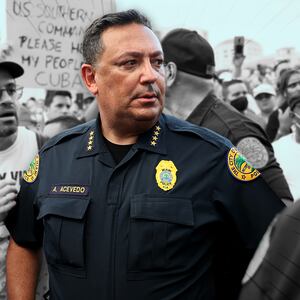The Miami City Commission voted on Thursday to fire Art Acevedo, the city’s police chief who’d been sworn in to praise from many of the same officials who believed they’d caught a “big fish,” but flamed out after just six months on the job.
After hearing testimony from two high-ranking members in the police department (both of whom had previously applied for Acevedo’s job before he was appointed), as well as the city manager who’d hired Acevedo and then suspended him earlier this week, the commission decided unanimously to fire him—a decision that The Daily Beast has previously reported seemed likely.
The hearing was based on the suspension letter City Manager Arthur Noriega had sent to Acevedo on Monday, which charged him with losing the confidence and trust of the department, issuing “unauthorized” threats about disciplining employees who didn’t get vaccinated, hiring and firing department members without following protocol, and telling employees that the city and police department was run by a “Cuban Mafia.”
ADVERTISEMENT
While Noriega presented witnesses to speak to these charges, Acevedo’s attorney, John Byrne, declined to bring any witnesses, arguing Acevedo had not been given enough time to come up with his defense, and that it wouldn’t have mattered if he had since Acevedo’s termination had been sealed as soon as he released a scathing eight-page memo in September accusing the city of corruption. “We believe that this outcome has already been preordained,” Byrne said.
Acevedo, who was present at the hearing, did not address any of the city commissioners, despite their insistence towards the end that he defend himself.
“He had the courage to write a false memo full of lies,” said Commissioner Alex Diaz de la Portilla. “He should have the courage to stand up here and address this commission. The courage and the guts to do it. He clearly does not.”
The Miami Herald reported that following the commission vote, Acevedo read from a statement outside of City Hall. “From day one I made it clear the Miami Police Department had to be committed to constitutional policing,” Acevedo said. “The department was and continues to be in need of reform. I lament the fact that I do not have the opportunity to continue serving.”
Acevedo, who did not respond for a request for comment from The Daily Beast, said in the statement that he had also referred the findings from his memo to “the proper government authorities.”
Acevedo’s Sept. 24 memo accused members of the city leadership, including Diaz de la Portilla, of meddling in investigations and using the police department as their “personal enforcers” among other things.
It was released shortly before the city commission met twice in recent weeks publicly to air out their own grievances against Acevedo. Among their concerns were Acevedo’s firing and demotion of longtime department members, past lawsuits against him in California and Texas, and a photo of him wearing an Elvis costume that was apparently too tight around the crotch.
In a letter to Acevedo after suspending him on Monday, Noriega said that during the chief’s short time in the city his decisions made the city manager “lose confidence” in his leadership of the department.
“Instead of taking the time to first commit yourself to developing and fostering trust both within the department and the community, you were brash and hasty in many of your comments and actions,” Noriega wrote. “Many of these problems could have been avoided had you made the effort to understand and cultivate key relationships and establish trust.”
At Thursday’s hearing, Manny Morales, who was named interim police chief after Acevedo’s suspension, told commissioners that Acevedo’s short tenure had led to the “systematic demoralization” of the department as he accused staff of being “backstabbers.” He said Morales’ comments about the Cuban Mafia in the city, which were made in the context of a conversation about a greater need for non-Cuban members in the department’s leadership, “showed how out of touch [Acevedo] was.”
Armando Aguilar, an assistant chief of police in the department, said the public feud that has developed between Acevedo and members of the city commission has only created chaos in the department. “Everybody really takes the negative attention to heart.”
Both Morales and Aguilar had previously been candidates for Acevedo’s job before he was hired in April and said during the hearing that they would consider re-applying for his job after he was terminated.
During the hearing, Noriega said that an Oct. 1 incident involving executive staff members of the department who were allegedly chewed out by Acevedo’s handpicked deputy chief was a “significant moment” that led to his decision to suspend the chief. Morales and Aguilar, who were present during the incident, said Acevedo did not stop the tirade and instead left.
Other issues brought up against Acevedo included a threat he allegedly made to department employees about a possible vaccine mandate and time off that he didn’t clear through the proper channels.
Noriega said he had “nothing personal” against Acevedo, but said the reason Acevedo needed to leave boiled down to him not taking time to “earn the trust” of his community and police department, instead using his brash style to try and effect change. “Your style, how you lead, how you inspire people, matters,” Noriega said. “And threatening them and bullying them is really not a way to foster trust and confidence, especially when you’re not from here.”
On Tuesday, Miami Mayor Francis Suarez, who called Acevedo the “Tom Brady” or “Michael Jordan” of police chiefs when his hiring was announced in April, finally broke his silence about the drama unfolding around Acevedo. In a press conference Suarez said Noriega’s suspension letter marked the “beginning of the end of an unfortunate episode” for the city.
Suarez said that while Acevedo has the qualifications and experience to be an effective chief, “it is also obvious that his personality and leadership style are incompatible” with the city. He said the status quo where Acevedo and city commissioners were publicly quarreling was “untenable and unsustainable.”
In an email to all staff with the subject line “Farewell”, Acevedo doubled down on his efforts to root out corruption in the city and police department. “I promise to continue the good fight to rid MPD of the political interference from city hall that unfortunately continues to negatively impact this organization,” he wrote.
In his September memo, Acevedo called out his loudest critic, city commissioner Joe Carollo, for allegedly attempting to use the police department against political enemies and said Carollo and commissioner Diaz de la Portilla gave him with a “target list” of businesses the department “wasted untold hours” investigating. Carollo and Diaz de la Portilla denied the claims, which were further detailed in a lawsuit filed days after Acevedo’s memo by Bill Fuller, a real estate developer in the Little Havana area in Carollo’s district who told The Daily Beast he believes Carollo has been unfairly targeting his businesses with code enforcement “raids” meant to drive him out of town.
On Thursday, Quinn Smith, a challenger to unseat Carollo in a November election, told The Daily Beast that Acevedo’s memo was very troubling to many in the district, particularly business owners and those contemplating investing in the area. The fact that Acevedo is now gone makes it unlikely that the claims will be taken seriously, he said.
“It’s unnerving to the business community to know that these kinds of allegations wouldn’t be taken up,” Smith said.
Smith said he believes the resistance to Acevedo’s confrontational style is ironic given that he was brought in to help reform the department. As soon as Acevedo pointed out needed changes, Smith said, it seems like he was given the boot. “If there was nothing to reform then why did you hire him?” he told The Daily Beast. “And if there is something to reform, then the process is going to uncover uncomfortable things.”
In response to questions about Acevedo’s memo, Mayor Suarez on Tuesday said he had not been consulted before it was drafted and believed it created more problems for the ousted chief. “When you throw down the gauntlet in that way, you certainly set up a scenario that could be untenable,” he said. Nonetheless, Suarez deflected questions from reporters about the credibility of Acevedo’s claims.
“I am not going to opine on his allegations,” Suarez said. “He has made allegations. And those are to be, presumably, analyzed by investigatory and or prosecutory agencies.”
Ken Harms, a former chief of police in Miami in the 1980s who had been involved in picking a new chief earlier this year before Acevedo was swiftly hired, told The Daily Beast that Acevedo’s memo and allegations were mostly smoke and mirrors.
“That’s 90 percent bullshit,” Harms said. “He was throwing a lifeline to try to salvage his own ass.”
Harms said that if Acevedo had credible evidence that commissioners were breaking the law, he would have gone to the State Attorney’s Office, the Florida Department of Law Enforcement, or, as Carollo theatrically suggested himself in one commission meeting, arrested commissioners there on the dais. “He didn’t do any of that crap,” Harms said.
Like other long-time members and supporters of the Miami Police Department, Harms said he was happy to see Acevedo go. “They never should have brought him in,” he said, adding that Acevedo wasn’t properly vetted and his hiring was rammed through thanks to the city manager and mayor, disrupting a process that had already been ongoing. “He was a lost cause before he got here.”
It is unclear what compensation Acevedo will be getting on his way out the door, although Harms noted that Acevedo’s yearly salary was well over $300,000.
“I’d be curious to know whether Acevedo is getting a golden parachute to leave,” Harms said.
Angela Roberts, the HR manager for the city did not respond to a request for comment.






